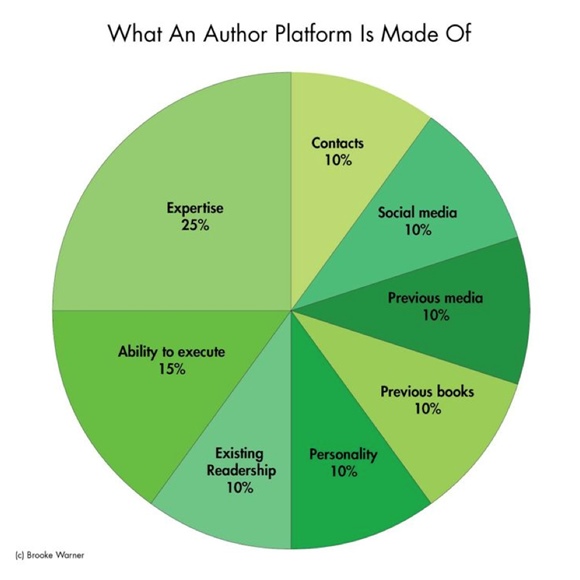 A platform is a necessity whether you write fiction or nonfiction. It provides the foundation for your promotion plan, which you put to use when your book is released. Without a platform, your promotion plan won’t be effective. But how do you know if your author platform has the visibility, reach, authority, or influence in your target market to help you sell books?
A platform is a necessity whether you write fiction or nonfiction. It provides the foundation for your promotion plan, which you put to use when your book is released. Without a platform, your promotion plan won’t be effective. But how do you know if your author platform has the visibility, reach, authority, or influence in your target market to help you sell books?
To know if you’ve built an effective author platform with your blog and blogged book, take the time to evaluate it. Pay attention constantly to your readership growth and engagement.
Bloggers and book bloggers build author platform via a blog. But your platform has many elements and must grow continuously in a variety of ways to be effective.
How to Create a Platform
You can create an author platform in many of ways. You can:
- Create a blog or blog a book
- Get involved on social networks
- Become a speaker
- Seek out media appearances
- Create your own radio show or podcast
- Use Google, Twitter or Facebook ads
- Produce YouTube Videos
- Run a podcast
Maybe you’ve participated in some of these platform-building activities in the past and garnered an audience, followers, readers, or listeners. Hopefully, you also managed to send these people to your blog. That’s great!
But there’s more to author platform.
Platform also consists of your contacts, expertise, and any additional books you’ve written. Plus, you add to your platform as well. Your brand and who you are play a role.
Here’s a great chart featured on www.thewritelife.com and created by editor Brooke Warner of She Writes Press as part of Brooke’s blog post about why author platform is so important. (I suggest you read it.)
Evaluate Your Author Platform
To evaluate the effectiveness of your author platform, determine what platform elements you have in place and how strong they are.
For each one of the areas in Brooke Warner’s pie chart, determine if you have built any platform to date and, if so, how much. Use numbers, such as the amount of followers you currently have on Twitter or the number of readers that frequent your blog, or general information or descriptions.
Start by listing each category in Brook’s pie chart. Then place information in each category.
For contacts, wrack your brain for big names, people who are celebrities or thought leaders in your industry, who might help you or your book with testimonials or other types of publicity. (Think Oprah.)
Social media is simple. List all the social networks, and then take an accounting of the number of followers you have in each.
Media is easy, too. List the different media appearances you have made, if any. Include internet radio and podcasts.
List your previously published books, if any. If you’ve been in an anthology or compilation book, include this.
Measure your existing readership in blog readers, subscription to your blog or newsletter, or books sold. Your blog and email list prepresent your biggest platform assets. Discover how many page views and unique visitors you have daily, weekly or monthly, for example.
When it comes to personality, this is the “you” part I mentioned, and this is subjective. Are you positive, personable, outgoing, helpful, cheerful, and professional? Are you, or can you become, a media darling? Ask others to give you some honest feedback. Or look to the feedback you’ve gotten in the past when you have spoken in public.
Ability to execute can be subjective. Evaluate this looking at if you have built platform previously, have the funds for promotion, have contacts who will help you promote, have a background in marketing, or are simply a go getter and super willing and able to help sell your book upon release—or that you don’t have any one or more of these elements.
Look to your bio or CV for expertise. Then determine how you rank among thought leaders and experts in your industry.
Is Your Platform Convincing?
With all the numbers and descriptions in place, evaluate your platform. Is it large or strong? Where do you need to reinforce or build your platform?
Remember, your author platform convinces an agent and an acquisitions editor at a publishing house that you will and can execute your promotion plan. Without a platform, you are less likely to land a publishing deal.
Your platform convinces publishing professionals that you have an audience ready and waiting to buy your book upon release. Even if you self-publish, you still need a platform. Actually, you need one more than a traditionally published author, whose books will appear on bookstore shelves and might get additional distribution perks or even a bit of promotion help from the publisher.
Knowing this, keep tabs on your growth. Write down updated numbers every week or month. Determine if your platform is growing at a steady pace. If it’s not, you need to re-evaluate your efforts and find new ways to strengthen your platform. If it’s growing steadily, pat yourself on the back and get back to blogging your book.
How does your author platform measure up? Did you discover that your platform is stronger—more effective—or weaker—less effective–than you thought?
Photo courtesy of skeeze|Pixabay.com.


Leave a Reply